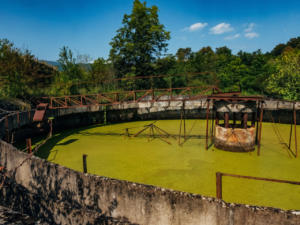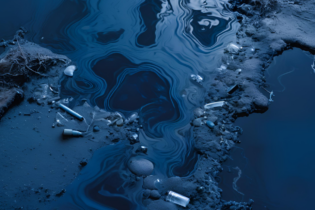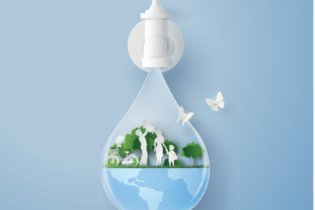The Department of Water and Sanitation’s (DWS) Deputy Minister – Isaac Sello Seitlholo – talks to Kirsten Kelly about proactive measures being implemented to address water pollution.
“Water pollution in South Africa has worsened, and it has worsened largely due to the collapse of municipal governance. By not properly planning for, operating, maintaining or building water and sanitation infrastructure, raw sewage is running down some streets in this country and our dams and rivers are being polluted by broken down wastewater treatment works. This had led to the proliferation of alien invasive plants such as the Water Lettuce in the Vaal River and the Hyacinth in Hartebeespoort Dam,” notes Seitlholo.
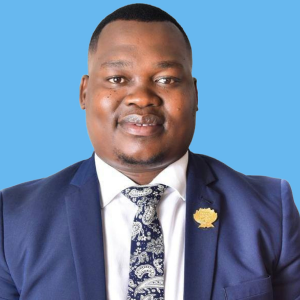
Deputy Minister Seitlholo
He adds that Water Service Providers (WSPs) have to abstract this polluted water and treat it to potable standards. “Water pollution has raised the cost of water treatment, and is a direct threat to water security, the economy, the livelihood of businesses and health of the public. Unfortunately, many of these failing municipalities do not have the means to turn this situation around in the short term. I do believe that the private sector as well as capable water boards are best placed to assist with dealing with the collapse of water and sanitation infrastructure.”
Deputy Minister Seitlholo has visited a number of municipalities over the past few months, a majority of which are in the Free State. He visited Springontein in Kopanong Local Municipality, where all nine of their wastewater treatment plants are either partially operational or not working at all.
“Mafube Municipality received 0% in the Green Drop Report. Matjhabeng Municipality’s sewage woes are also well documented due to years of neglect. When I visit these municipalities, I hope to bring attention to the fact that they need to give up the running of their water and sanitation services to more capable entities. Corrective action plans hold no weight when it is clear that they are unable to implement those plans.”
Litigation
The DWS have issued directives to non-compliant municipalities for failure to take reasonable measures to prevent pollution of the water resources. Alarmingly, every single municipality in the Free-State has been either issued with a Section 19 Directive or notice from the Regulation, Compliance and Enforcement Branch. Criminal cases have been opened against 52 municipalities.
“Generally, when directives are sent to the private sector, companies usually react quickly to rectify their actions. Unfortunately, the biggest polluters (municipalities) are slow to react, if they react at all. It is extremely challenging to sue other organs of state. An inter-governmental process must be followed regarding civil and criminal litigation. This is because the Constitution states that organs of state must avoid legal proceedings against each other. Therefore, before instituting civil or criminal action against another organ of state, the DWS must exhaust all measures before going to court,” maintains Seitlholo.
“This process can take a few years, and during that period, municipalities could have allocated resources, used grants, ring fenced funding and taken corrective measures to deal with the breakdown of their infrastructure. But very often, they will wait until the court process is finalised. And a lot of money (that could have been directed elsewhere) is allocated towards legal fees,” he says.
“The DWS,
Department of Cooperative Governance and Traditional Affairs (Cogta) and the South African Local Government Association (Salga) need to sit together and find a solution to failing municipalities that are threatening our water resources. Municipalities must appoint the correct people in the correct positions and ring-fence revenue for water and sanitation infrastructure.”
National Polluters Register
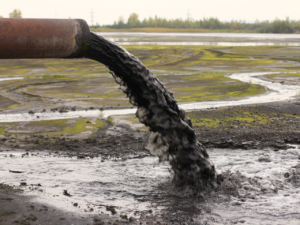
The Department is in the process of creating a database with the names of polluters in the country -the National Polluters Register. The database will be utilised to keep a record of all polluters in the country as well as their transgressions and actions taken against them. It will assist the DWS to bring attention and pressure to polluters, with the hope that it brings change in their behaviour. The register will then be placed on the departmental website where members of the public will be able to access it.
“Currently, it is a working document, and the DWS is undergoing a process to make sure that the database would not open up the department to litigation. We want those in positions of authority, mayors and CEOs of companies to have their names put there in the register so that they account for the neglect that leaves our water polluted,” maintains Seitlholo.
In addition to the establishment of the
National Polluters Register, the DWS will establish dedicated channels for stakeholders and the public to participate in reporting pollution, such as dedicated reporting desks; embark on a people-centred national campaign on water anti-pollution; strengthen regulatory, compliance and enforcement capacity; and establish dedicated green investigative units and tribunals.
Vaal River Anti-Pollution Forum
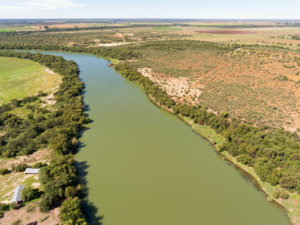
Vaal River South Africa
Seitlholo will be leading the anti-pollution drive across the country. Recently, the Vaal River Anti-Pollution Forum was launched to mitigate the years-long pollution impacting the Vaal river’s water quality.
With the aim of protecting the Vaal River and providing high-level guidance, the Vaal River Anti-Pollution Forum will coordinate, improve and integrate efforts to manage the water quality of the Vaal River in line with determined resource quality objectives.
Members of the non-statutory forum include various stakeholders, particularly those directly affected by the declining water quality.
This will be done through addressing risks elevated by the 16 catchment management forums – ten in the Upper Vaal, four in the Middle Vaal and two in the Lower Vaal – which will continue to operate as normal but will escalate systemic challenges that cannot be resolved within these sub-catchments to the forum.
“The forum, through task teams, will also investigate and make recommendations on short-medium- and long-term actions that must be taken to improve the performance of the smaller forums and to elevate and effect any systematic actions in improving the water quality status in the Vaal, linked to the Catchment Management Strategy for Vaal Orange Catchment Management Agency and the larger national water quality strategy to synchronise role player actions,” says Seitlholo.
The forum is also responsible for the coordination and support of awareness- building initiatives regarding water quality management in the Vaal River catchment; ensuring adequate stakeholder participation in the forum processes; and investigating and recommending innovative and best applicable technologies to deal with water pollution. The forum will identify remedial actions to mitigate the impact of contamination and pollution as a result of water use by sectors such as mines, industries, agriculture and wastewater works, besides others.
Members of the forum will also be responsible for enhancing collaboration with various institutions to improve the quality of the Vaal River; providing support to the existing catchment forums in the Vaal River; and publishing reports on a yearly basis to track the performance and implementation of recommendations and activities of the forum.
“This is all about managing water resources at a ground level. We will have people engaging with communities and businesses. They will have first-hand information. It is also my hope that through the successes and lessons of the Forum, we may be able to replicate this work throughout the country. The government of national unity will be judged on its ability to grow the economy, and this will be impossible unless we start looking after our water resources,” states Seitlholo.
He concludes that he is encouraged by the deep commitment that water professionals, businesses and non-profit institutions have towards providing a consistent supply of clean and safe water and sanitation.
“I am supported by a strong team, at the age of 35 I have the passion and energy to tackle pollution. And the previous DWS Minister Senzo Mchunu has certainly done a lot of important groundwork that will give us the tools to turn this dire situation around.”

 The Department is in the process of creating a database with the names of polluters in the country -the National Polluters Register. The database will be utilised to keep a record of all polluters in the country as well as their transgressions and actions taken against them. It will assist the DWS to bring attention and pressure to polluters, with the hope that it brings change in their behaviour. The register will then be placed on the departmental website where members of the public will be able to access it.
“Currently, it is a working document, and the DWS is undergoing a process to make sure that the database would not open up the department to litigation. We want those in positions of authority, mayors and CEOs of companies to have their names put there in the register so that they account for the neglect that leaves our water polluted,” maintains Seitlholo.
In addition to the establishment of the National Polluters Register, the DWS will establish dedicated channels for stakeholders and the public to participate in reporting pollution, such as dedicated reporting desks; embark on a people-centred national campaign on water anti-pollution; strengthen regulatory, compliance and enforcement capacity; and establish dedicated green investigative units and tribunals.
The Department is in the process of creating a database with the names of polluters in the country -the National Polluters Register. The database will be utilised to keep a record of all polluters in the country as well as their transgressions and actions taken against them. It will assist the DWS to bring attention and pressure to polluters, with the hope that it brings change in their behaviour. The register will then be placed on the departmental website where members of the public will be able to access it.
“Currently, it is a working document, and the DWS is undergoing a process to make sure that the database would not open up the department to litigation. We want those in positions of authority, mayors and CEOs of companies to have their names put there in the register so that they account for the neglect that leaves our water polluted,” maintains Seitlholo.
In addition to the establishment of the National Polluters Register, the DWS will establish dedicated channels for stakeholders and the public to participate in reporting pollution, such as dedicated reporting desks; embark on a people-centred national campaign on water anti-pollution; strengthen regulatory, compliance and enforcement capacity; and establish dedicated green investigative units and tribunals.


